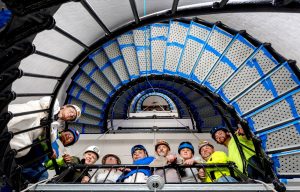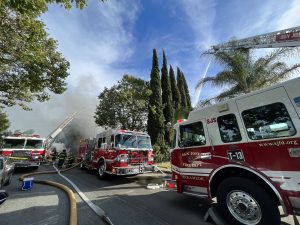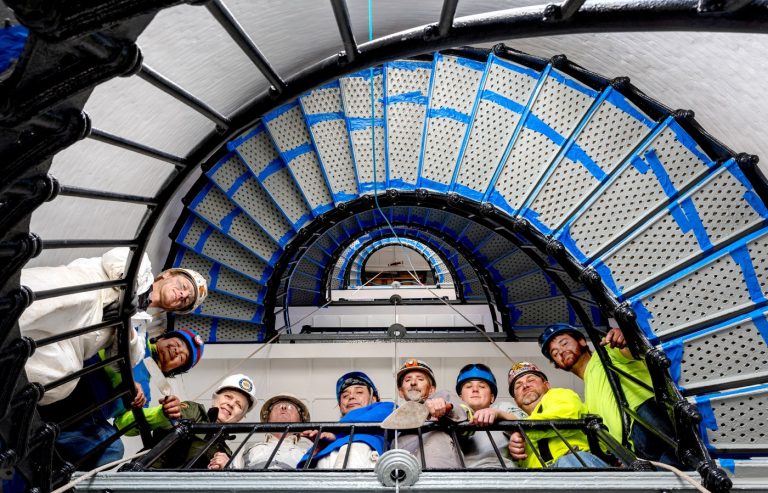Despite a wet winter and heavy snowpack, California’s 2024 wildfire season kicked off over the weekend with the state’s largest blaze of the year, the Corral Fire south of Tracy and east of Livermore.
The blaze ignited Saturday afternoon and burned out of control through Sunday, injuring two firefighters, forcing evacuations, destroying one home and turning vast swaths of once-golden rolling hills into blackened wastelands.
In 24 hours, the Corral Fire burned 14,000 acres, more than the entire acreage torched by the 1,253 wildfires in California so far this year, according to Cal Fire statistics. By Sunday evening, the blaze was 50% contained, the agency said.
“We have a very, very robust grass crop this year, and that’s what led to the fire,” Cal Fire Capt. Robert Foxworthy said Sunday afternoon.
Lush grasses that flourished from winter rains are now dead or dying and drying out all over the state. Areas such as the East Bay hills are at particularly high risk when winds come up, as happened Saturday when the fire started around 2:30 p.m. and winds up to 40 mph and even stronger gusts pushed it to nearly 10,000 acres within hours, Foxworthy said.
Those drying grasses can be expected to lead to “an uptick in grass fires in coming weeks,” San Jose State University professor Craig Clements, director of the Wildfire Interdisciplinary Research Center, said this week. Temperatures are expected to rise sharply in the region starting on Tuesday. Concord is expected to see a high of 96 degrees Tuesday, with San Jose hitting 90 and Oakland 83, according to the National Weather Service. In many areas around the Bay Area, the mercury is expected to rise further Wednesday before starting to cool Thursday.
The Corral Fire came just a day after Cal Fire, citing “abundant” grasses dried by wind and warming temperatures, announced on Friday the suspension — starting Saturday — of residential outdoor debris-burning permits in Santa Clara, Alameda, Contra Costa and western San Joaquin and Stanislaus counties.
Two firefighters from Alameda County Fire Department were injured while battling the blaze. “They were
transported to local hospitals, where they are being cared for and evaluated,” the department said in a news release Sunday afternoon. A Cal Fire spokesperson said the firefighters were in stable condition and recovering.
The cause of the fire was still under investigation Sunday afternoon, Cal Fire said. Alameda County Fire Department said Sunday that it had performed a prescribed burn Friday in the area of the fire, but it was out by 3 p.m. and the department does not see any connection between that operation and the Corral Fire.
As of Sunday evening, only one structure had been damaged, a home considered a total loss, Cal Fire said.
Two hundred homes in the Tracy area had been under an evacuation order that was lifted Sunday at 6 p.m, replaced with an evacuation warning. It was unclear how many residents fled. Those living in the warning area were urged Sunday evening to remain vigilant and prepare for a change in the situation.
Cal Fire warned California residents to clear all dead or dying vegetation within 100 feet of homes.
Firefighters on Saturday were confronted with sustained winds of 30 to 40 mph, and gusts up to 60 mph, and “weren’t even able to make a direct attack,” said Cal Fire spokeswoman Cecile Juliette.
“When you get winds that are that high they move a grass fire very quickly,” Juliette said. Lighter winds on Sunday allowed firefighters to make significant headway, she said.
A fire this large in early June should be “an eye-opener” for the public, Juliette said. “Usually, you don’t really start to ramp up and get to that size until July,” she said.
Of greatest concern to fire officials was the new Tracy Hills subdivision, which so far has a handful of homes, and the neighborhood around Tracy Golf & County Club where the house was destroyed.
The home, which burned largely to the ground, sat in front of hills burned completely black, between houses apparently untouched by fire. Two charred palm trees stood at the entrance to the driveway of the ruined home, which held several burned-out cars. Melted fencing lined the property’s edge.
The cause of the fire was still under investigation Sunday afternoon, Cal Fire said. Alameda County Fire Department said Sunday that it had performed a prescribed burn Friday in the area of the fire, but it was out by 3 p.m. and the department does not see any connection between that operation and the Corral Fire.
South of Tracy, a firefighting crew from Santa Cruz, supported by state prison inmate firefighters, had been battling the fire since around 6 a.m., and by Sunday afternoon were spraying water onto smoldering hot spots, to keep flames away from the Tracy Hills subdivision.
“We’ve just been out here doing mop up and just making sure that any potential for rekindling or the fire to spread is just stopped here,” Cal Fire Capt. Skylar Merritt said.
After I-580 was closed from I-205 to I-5 overnight and most of the morning, eastbound 580’s left lane reopened before noon, but the right lane remained closed from Corral Hollow Road to South Bird Road in San Joaquin County through Sunday afternoon. Westbound lanes were reopened Sunday morning, Caltrans said. By 6 p.m. Sunday, all eastbound lanes were open, Cal Fire said.
A temporary evacuation site was established at the Larch Clover Community Center at 11157 W. Larch Road in Tracy.
Related Articles
Corral Fire spreads to 14,000 acres, but evacuation order lifted
Ex-professor from San Jose sentenced to prison for setting blazes near Dixie Fire
Battery-powered California faces lower blackout risk this summer
Gov. Newsom details plan to fix home insurance market woes, consumer advocate says it will cost consumers ‘billions’
Huge Oakland lumber yard blaze smolders as firefighters probe cause
Only three people were at the evacuation site on Sunday morning, according to Elise Vigil, San Joaquin County staff. However, people had been coming in and out since the fire began, Vigil said.
“Most people are stopping by here before checking into hotels or finding their own accommodations,” Vigil said.
The Hold Your Horses Emergency Evacuation Response Team also was called to respond to residents who might need assistance evacuating animals Saturday night.
The team was on standby, but the Contra Costa-based organization returned home without having to rescue any animals.
“We urge people to evacuate their animals ahead of time,” said Chantel Tieman, HYH cofounder. “Don’t wait, so you can get your animals into the evacuation site.”
The fire broke out Saturday around 2:40 p.m. near the Lawrence Livermore National Laboratory Site 300, southwest of Tracy.
High winds from the west caused the quick growth of the fire as it burned east toward Tracy after starting around Saturday afternoon. From 4,900 acres at 7:40 p.m., the blaze exploded to 8,800 acres by 8:50 p.m., according to Cal Fire.
By 6 a.m. Sunday, 12,500 acres had burned and the blaze was just 15% contained.
As of 8 a.m. Sunday, improved weather conditions allowed crews to advance in constructing and enhancing control lines. At least 400 firefighters were deployed to the fire, and Cal Fire said “numerous firefighting air tankers from throughout the state are flying fire suppression missions as conditions allow.”
The fire, reported earlier Saturday afternoon as 40% contained, was downgraded to just 10% contained as of 8:50 p.m. on Saturday evening, Cal Fire reported.
High winds hampered firefighters’ efforts to get control of the fire early on. Air fire crews struggled to find air space to fly safely in as winds gusted over 40 mph, Cal Fire Battalion Chief Josh Silveira said. Fire crews from across the area — including Alameda County, Santa Clara County and San Joaquin County, were combatting the fire from the ground.
Those high westerly winds pushed the fire eastward toward Tracy and Stockton, said Craig Shoemaker, a meteorologist with the National Weather Service in Sacramento.
To make matters worse, the wildfire broke out along the Altamont Pass, where winds pick up speed as they squeeze through the tight canyon, allowing the fire “to spread and really get going,” Shoemaker said.












